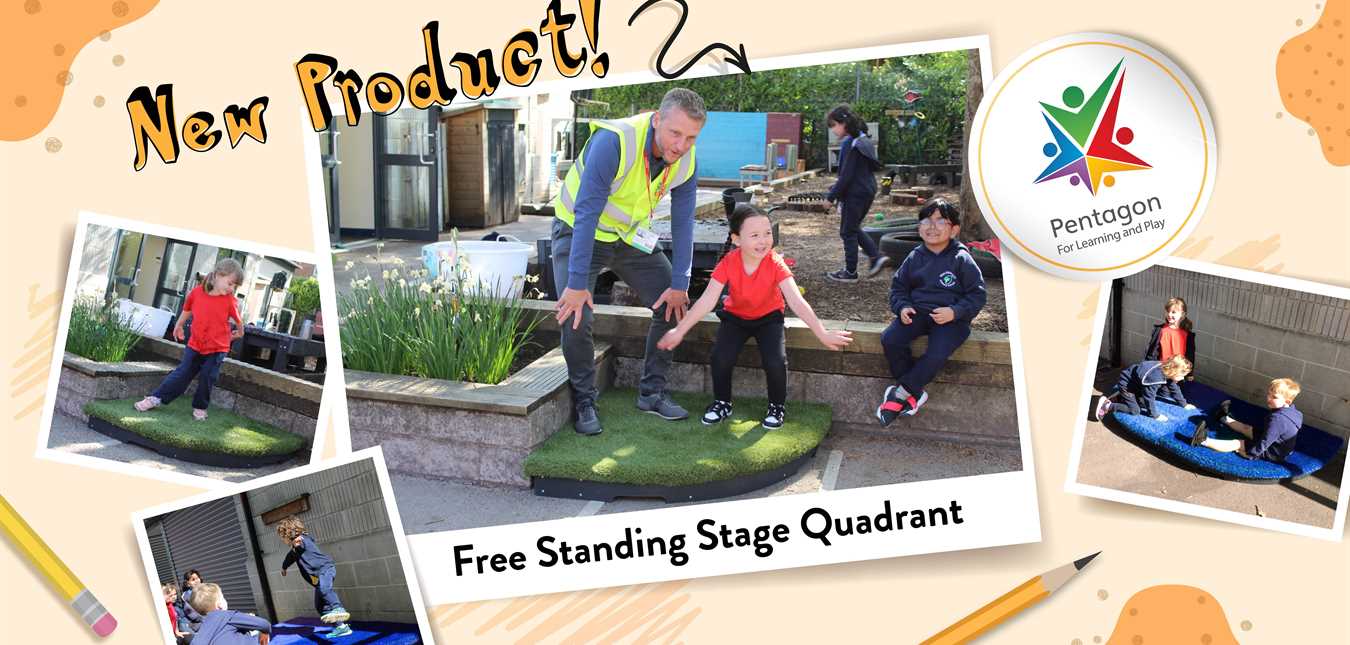
Company News
Give Learning a Leading Role with Stellar Stagecraft and Performances in Your Playground!
With the launch of our new Stage Quadrant this summer, we have been reminding ourselves of the many values of introducing drama to the outdoor learning environment.
We work in collaboration with some wonderful primary schools across the country, to ensure that our products continue to fulfil childrens’ educational needs to the highest of standards - we’re learning all the time too, and we love to see the positive impact that a Pentagon playground brings to young learners!
When we first introduced our new Stage Quadrant, we were treated to some super spontaneous performances by a group of little stars. It got us thinking back to just why we created this space-optimising product in the first place…
“We must all do theatre, to find out who we are, and to discover who we could become.” - Augusto Boal
Drama is a powerful educational device. Through purposeful drama and role play activities, teachers can nurture children’s creative skills, helping to develop their social and emotional intelligence, improve their language and communication skills, boost their self esteem, and promote good physical health and mental wellbeing.
It’s a ‘safe space’ outlet for developing personalities, where opportunities to explore and empathise with different characters encourages children to grow into happy, confident and well rounded individuals.
In the Early Years especially, drama and role play can be used to delve deeper into topics covering all the areas of learning, enabling children to successfully achieve their Early Learning Goals. This approach can be continued right the way through primary school, leading to successful learning outcomes across the curriculum.
So much packed into one little word - drama! But of course as with most things, none of this just ‘happens’! In order to really achieve all of these aims, it’s helpful to know a bit more about how to deliver drama activities with purpose.
There are 3 simple but important steps to follow when setting up drama-based activities. Stick with this method and you can’t go too far wrong!
Pick a Learning Objective
More often than not you will find that any drama activity you choose presents a few different learning objectives all rolled into one. The important thing is to have a clear reason behind what you’re trying to achieve with the children, so there is focus and so that the activity doesn’t descend into a free for all. Of course there’s nothing wrong with a bit of chaos here and there - that’s all part of the fun and part of the learning process! But there needs to be a reason behind it all.
By way of example, the objective of a drama session could be to explore the theme of ‘People Who Help Us’. Activities could involve asking children “Can you act like a doctor/firefighter/paramedic/teacher/postal worker etc?” and the learning goal would be that they can all identify a way in which someone has helped them, or helped someone they know.
Establish a Narrative
You need to have a good outline story for your drama session in order to keep children interested and engaged. Ideally go for something with strong and clearly defined characters that the children can take on, and something that has an obvious beginning, middle and end - with plenty of space for creativity and artistic licence in between to get their imaginations going!
A clear narrative helps to define what it is that you’re looking to achieve. Flexibility within the narrative is brilliant as it encourages children to express themselves in their own way, and allows them to set their own learning goals too.
A good example of a clear narrative is the story of Zog by Julia Donaldson, and it fits in well with the objective example above following the theme of ‘People Who Help Us’ - with a teacher, a doctor and a ‘flying ambulance’!
You could try sharing the story of Zog with the children, and ask them to think about the different things that the young dragons are trying to learn - how to roar, fly and breathe fire! Can they use their imaginations and act out ways of doing these things themselves? How can they get themselves up in the air and soaring across the skies, or breathing the biggest flames?! This can be used to get them moving, thinking up new ideas and collaborating with others.
Set your scene
It’s really important that children find themselves in a stress-free, welcoming environment in order that they can properly relax, be open to expressing themselves and trying new activities out, and be able to enjoy and benefit from the drama experience as a whole.
The outdoor learning environment is an ideal place for drama activities, as it’s somewhere children are naturally more awake, engaged, relaxed and in their creative space, with more room to move around.
Using our example, if you wanted to create a scene where you might find dragons, you could ask the children to describe how they might imagine the landscape. Is there a castle, a mountain or a cave? Could they use props/toys to dress their stage or paint their own backdrop? Or will they stick to using their imaginations, perhaps trying to avoid, climb up or climb into imaginary obstacles as they move around?
Giving children an active role, involved in setting their stage, taking responsibility and making the activity their own, is a great confidence booster, and helps them to get the most from the overall learning experience.
Take a look here at our fabulous range of Outdoor Performance Stages for schools and nurseries - including our brand new Stage Quadrant, designed to immediately transform any corner of your playground into a flexible theatre of dreams!






